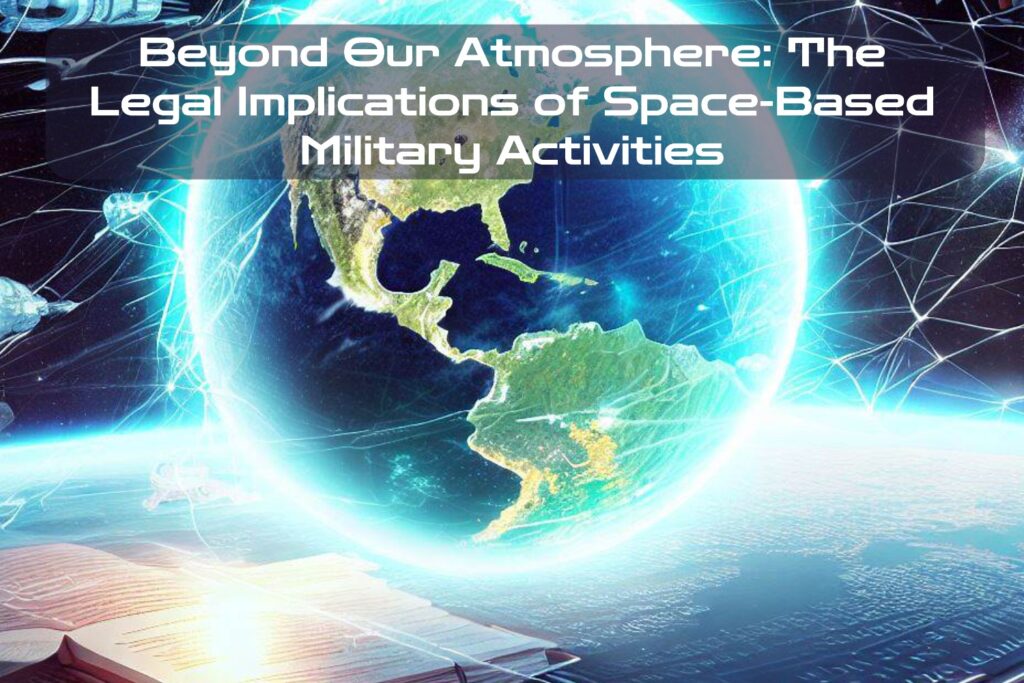The Militarization of Space and its Implications on International Law
The Potential for Space-Based Military Activities
As technology progresses, so does the potential for military activities in space. Satellites are already used for communication, weather monitoring, and even surveillance.
However, the concept of using space as a platform for military operations seems to be getting closer to reality. Unlike land-based or sea-based warfare, there is no atmosphere in space, which means that weapons could be deployed with greater speed and precision.

The ability to strike an enemy anywhere on Earth within minutes could revolutionize warfare. There are many different ways that militaries could utilize space in the future.
One possibility is using satellites equipped with lasers or missiles as a form of defense against incoming threats such as ballistic missiles or aircraft. Another possibility is deploying manned spacecraft armed with weapons that can travel great distances quickly in order to take out strategic targets.
The Importance of Discussing the Impact on International Law
The idea of having weapons in space raises multiple concerns when it comes to international law.
In 1967, the Outer Space Treaty was signed by most nations, which prohibits countries from placing nuclear weapons or other WMDs (weapons of mass destruction) in orbit around the Earth or on any celestial body.
While this treaty has been successful at preventing a potential arms race in orbit, it does not specifically address conventional weapons. Therefore, it is important to consider how international law may need to adapt if militaries start deploying more sophisticated weaponry into space.

There are many questions that need answers
How will nations respond if other countries start using space-based weapons?
How will alliances shift?
What impact will this have on global tensions?
The militarization of space also raises ethical considerations
Is it morally justifiable to use force from above?
What happens if there’s an accident involving an attack from outer space?
These are just a few of the issues that need to be addressed if space-based military activities become a reality.
Space-Based Military Activities: What Are They?

Space-based military activities refer to the use of space technology, infrastructure, and resources to support military operations. This includes the development and deployment of satellites for communication, navigation, and intelligence-gathering purposes.
It also involves the use of space-based weapons systems for offensive or defensive purposes.
Satellites have become an integral part of modern warfare.
They provide real-time information on enemy positions, troop movements, and weather patterns that allows military forces to plan their operations more effectively. Satellites also enable long-range communications between troops on the ground and commanders in headquarters situated far away from the battlefield.
In addition to communication and intelligence-gathering satellites, there are several types of space-based weapons systems that are currently being developed or tested by various nations. These include anti-satellite missiles, directed-energy weapons like lasers or microwaves, and kinetic energy weapons that rely on impact force to destroy targets in space.
Examples of Current and Potential Future Uses
The use of space technology for military purposes is not new. The US started using spy satellites to monitor Soviet missile sites during the Cold War.
Today, several countries have deployed their own satellite constellations for defense purposes.
For example, China has launched a network of spy satellites called Yaogan that are used for reconnaissance missions.
As technology advances, so do potential uses of space-based military activities.
One such application is Space-Based Solar Power (SBSP), which involves harvesting solar energy in orbit using large solar panels that can then be transmitted back to Earth as a source of renewable energy.
In addition to being an alternative source of power for civilian use on Earth, SBSP could also be used as a power source for military installations or vehicles in orbit.
Another potential use is Space-Based Missile Defense (SBMD).
This involves deploying weapon systems in space capable of intercepting incoming missiles before they reach their target. While there are currently no operational SBMD systems, the US and several other countries have conducted tests of such systems.
Overall, the potential uses of space-based military activities are vast and varied. The development of new technologies and weapon systems will continue to shape the future of space-based military operations.
International Law and Space-Based Military Activities

An Overview of International Law Related to Space-Based Activities
When it comes to space-based activities, there are a number of international treaties and agreements that have been put in place over the years to govern them.
One of the most well-known is the Outer Space Treaty of 1967, which was signed by more than 100 countries and sets out a framework for the exploration and use of space.
Other notable agreements include the Moon Agreement and the Rescue Agreement, among others.
However, while these agreements cover many aspects of space exploration and use, they don’t necessarily address all potential situations that could arise with regards to military activities in space. This has led some experts to question whether or not current laws are adequate when it comes to regulating militarization in space.
How Current Laws May or May Not Apply to Military Activities in Space
One key issue with regard to military activities in space is determining whether or not existing international laws apply. For example, under current law, nations are prohibited from stationing nuclear weapons or other weapons of mass destruction in orbit around Earth. However, there are no specific provisions that prohibit conventional weapons from being used in space.
Another issue is determining which laws would apply if a conflict were to arise between two or more nations engaging in military activities in space. Would they be governed by Earth-based laws, or would there need to be new laws created specifically for conflicts taking place outside our planet’s atmosphere?
These questions remain unresolved at present but will likely become increasingly important as countries continue exploring ways to increase their military presence beyond Earth.
Overall, while international law has made significant strides when it comes to regulating peaceful uses of outer space over recent decades, regulations surrounding militarization may need further development as technology advances and global tensions shift over time.
Potential Impact on International Relations

The Butterfly Effect
Space-based military activities could have a significant impact on international relations. This is because everything in the world is connected, and even the smallest change can have far-reaching consequences.
A butterfly flapping its wings in Brazil can cause a hurricane in Texas, as the popular notion goes. Similarly, a single space-based military activity could lead to a series of events that could affect diplomatic relations between nations.
Potential Conflicts
One of the most significant concerns regarding space-based military activities is how they could lead to conflicts between nations. Space has traditionally been a peaceful environment where countries cooperate for scientific research and exploration. However, if one country decides to deploy weapons in space or conduct military operations from space, it could create tensions with other nations that fear that they are being threatened or outmatched.
For example, if country A decides to launch missiles from space targeting country B’s military installations, country B may feel compelled to retaliate by launching their own missiles from space targeting country A’s installations or civilian areas. This back-and-forth escalation could quickly spiral out of control and lead to an all-out war between countries.
Cooperation vs Competition
Another potential impact of space-based military activities on international relations is whether it will foster cooperation or competition among nations. Some argue that the deployment of weapons and other technologies in space will lead to an arms race similar to what occurred during the Cold War era when countries raced to develop nuclear weapons. Others argue that these activities will encourage cooperation among countries as they seek to share resources and knowledge related to space exploration and defense.
If nations work together towards common goals such as protecting Earth from asteroid impacts or exploring deep-space regions like Mars, it may strengthen diplomatic ties between them rather than weaken them. While the potential impact of space-based military activities on international relations is still uncertain, it is important to consider the possible consequences of these activities.
Any military activity in space could have far-reaching implications and risks triggering conflict between nations. On the other hand, if managed correctly, it may foster cooperation and lead to technological advancements that benefit all humanity.
Ethical Considerations

Examination of ethical considerations surrounding the use of weapons in space
When discussing space-based military activities, it’s important to consider the ethical implications that arise from using weapons in space. The concept of warfare beyond our planet has long been a staple of science fiction, but as technology advances at an astonishing rate, it’s becoming more and more feasible.
With that feasibility comes a host of ethical considerations, including the potential for debris that could endanger other spacecraft and the possibility of creating long-term environmental damage. Another consideration is the inherent difficulty in establishing accountability when conflicts take place beyond our planet.
As it stands now, there are few clear regulations on how nations should conduct themselves in space or how they can be held accountable for any wrongdoing. The potential for misunderstandings or unintended consequences is higher than ever before and could lead to disastrous outcomes.
Discussion on whether or not it is morally justifiable to engage in space-based military activities
The question of whether engaging in space-based military activities is morally justifiable depends largely on one’s perspective. Those who oppose such activities argue that we should prioritize peaceful exploration and collaboration instead. They also point out the high cost associated with developing and maintaining such technologies, which could be better spent on addressing issues like climate change or poverty.
On the other hand, proponents argue that military superiority is critical to national security and that by developing these technologies we can deter potential aggressors from engaging in hostilities against us. They also assert that continued investment into space-based military technology will ultimately benefit humanity as a whole by driving new innovations and discoveries.
Ultimately, determining what’s morally justifiable requires weighing these arguments against one another while considering both short-term risks and long-term benefits. As we continue to explore this topic, it’s essential that we remain mindful of these ethical considerations so we can make informed decisions about how to proceed.
Future Implications

Exploring the Future Potential of Space-Based Military Activities
As technology continues to advance, space-based military activities are likely to become more prevalent. There are already discussions underway about the potential use of space-based weapons systems, such as orbital platforms that can fire missiles at targets on Earth.
Some experts believe that these systems could be used to provide a significant tactical advantage in future conflicts. Another potential area for development is the use of space-based sensors and surveillance systems.
These technologies could provide real-time monitoring of enemy movements and capabilities, allowing for rapid response and precision strikes. However, there are concerns that this increased level of surveillance could lead to an erosion of privacy rights.
Overall, it is clear that the potential for space-based military activities is significant. As technology continues to advance, so too will our ability to develop new and innovative ways to harness the power of outer space.
Adapting Laws and Regulations in Response to Technological Advances

One challenge facing policymakers is how best to regulate space-based military activities in light of advancing technology. Current international laws related to space primarily focus on preventing conflict or militarization in outer space, but do not specifically address the use of weapons or other military equipment.
As a result, there are calls for updated regulations that can more effectively govern these emerging technologies. Some experts argue that existing treaties may need revision or extension, while others advocate for entirely new agreements dedicated specifically to governing space-based military activities.
Regardless of the approach taken by policymakers, it is clear that adapting laws and regulations will be critical as we continue down this path towards greater militarization in outer space. By doing so proactively, we can help ensure a safer future for all involved parties while still enabling progress towards further technological advancements.
Final Thoughts on the Potential Impact and Importance of Considering International Law When Discussing Space-Based Military Activities

As we continue to explore new frontiers in space exploration, it is important that we consider how our actions will affect others on Earth. The use of weapons in space has serious implications for international relations and could lead to unintended consequences. International law provides a framework for regulating activities in outer space but may need to be updated as technology advances.
It is crucial that we approach this topic with caution and make sure that any actions taken are ethical, responsible, and follow applicable laws. As we move forward with research into the potential uses of military activities in outer-space it will become more important than ever before that we consider all possible outcomes so as not to jeopardize our relationships with other nations.
While there are undoubtedly many benefits to exploring the use of outer-space for military purposes it is crucial that we balance those benefits against the risks they pose both ethically and legally. By considering these factors carefully before making decisions about how best to pursue this technology we can ensure maximum benefit without sacrificing our values or endangering our relationships with other nations.

C M, a seasoned editor, journalist, and consultant, is deeply fascinated by the convergence of technology, space, and the future of humanity.
With a particular interest in transhumanity, futurology, and the philosophical and ethical dimensions of these domains, C M serves as the lead contributor to SpaceSpotlight and TranscendSphere.
When not penning insightful articles on these rapidly evolving fields, C M indulges in their love for podcasts and books, proudly embracing their status as a ‘Happy Nerd Extraordinaire!’



